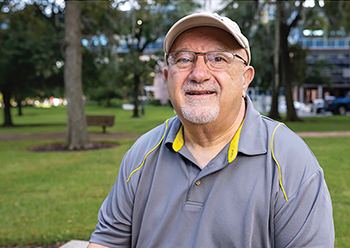Bladder Cancer Survivor
Face the challenge, then improvise, adapt & overcome

Ron Speidel had no family history of cancer, so he was very surprised when at age 62, he was diagnosed with bladder cancer. He faced treatment the way he faced 30 years as a police officer — with no fear. But when his cancer metastasized and his treatment options ran out, his doctors told him to get his affairs in order. Months later, a clinical trial opened up and he joined. Today, his cancer is stable and he is living life to the fullest with his wife.
Feeling fatigued and taking three to four naps a day, instead of my normal one, was the only sign something was wrong. I told my doctor at my yearly physical but he chalked it up to getting older. The day I woke up and saw blood in my urine was when I knew something was wrong. I called my doctor immediately. After seeing the results, he called a urologist, and I had an appointment with him the next day.
The urologist performed a scope to examine my bladder, scrape off some of the lining and do a chemotherapy wash. When the doctor received the results, he said it was bladder cancer and that I would need a specialist because he had done all he could do for me. He called a well-known cancer center and within 20 minutes he had me scheduled with a specialist there.
The genitourinary medical oncologist performed his own scope to confirm the diagnosis. He said the cancer had broken through the muscular wall of my bladder. He recommended intravenous chemotherapy with the harshest regimen over 8 weeks to aggressively shrink the tumors followed by surgery. The surgery involved removing my bladder and prostate and creating an ileal conduit, which would allow my kidneys to drain urine that would exit through a small opening called a stoma. The side effects of the chemotherapy were challenging, but the surgeries went great. My 3-month and 6-month checkups were all good.
It took some time, but I gradually adapted to having a stoma. Some people have a hard time adjusting to it. Men fear they won’t be able to be intimate again and women fear they won’t be able to go out and do the things they used to. But if you look at me, you’d never know I had a bag on the side. Today, they make special under- garments for people with stomas so there won’t be any bulges. Having a stoma is not something to fear. It’s just a new normal.
A year after the surgery, follow-up testing showed the cancer had returned and metastasized to the bone. The oncologist said there was nothing more that could be done and to get my affairs in order because the prognosis was probably 6 months. He discussed pain medication for bone metastases and offered to help set me up with Hospice.
I was devastated. Even though I’d spent 30 years as a cop in high crime areas and had seen man’s inhumanity to man, I don’t get upset. But this news was shocking. I’d been healthy my whole life. I raced bicycles and went to college on an athletic scholarship.
Once I came to terms with the news, I decided to attack the cancer. I’ve always been a scrapper, and I was not going down without a fight! I asked about joining a clinical trial, but my doctor said there weren’t any at the time.
Three months later, that changed. The doctor called to ask whether I was still interested in joining a clinical trial that was starting soon. It planned to test a new drug therapy on bladder cancer. I figured I had nothing to lose and I thought if the doctors could learn something from me to help others, I wanted to do it.
I passed all the eligibility tests and was considered a very good candidate for the trial. Every 10 days my wife and I traveled several hundred miles to the hospital where the trial was being conducted to do blood draws, have scans, receive the treatment infusion and go to follow-up visits. At the end of the treatment, I showed no metastatic activity and was proclaimed “stable.” Eight years later, the treatment has kept the cancer under control. My activity level is back up to near normal. I’m just a bit slower now.
For men having surgery to remove the prostate, ask for the nerve-sparing surgery if possible so that you may be able to regain sexual function. I am still functional today, but without the hormones from my prostate, my libido has dropped. People ask whether you can have sex with a bag. It’s a little awkward at first, but my wife and I have adapted and found a way to work around it. Communication with your partner is so critical to make it work.
Facing cancer is scary, but I tell others not to ever give up. I live by the motto “Improvise, adapt and overcome.” There will be challenges that you will face, but you can become comfortable with the changes if you get into the right mindset. Try to fight, stay positive, don’t dwell on the bad, and listen to your doctors because they know what to do for you. If you have any bad habits, now is the time to quit. It is possible to survive cancer.


